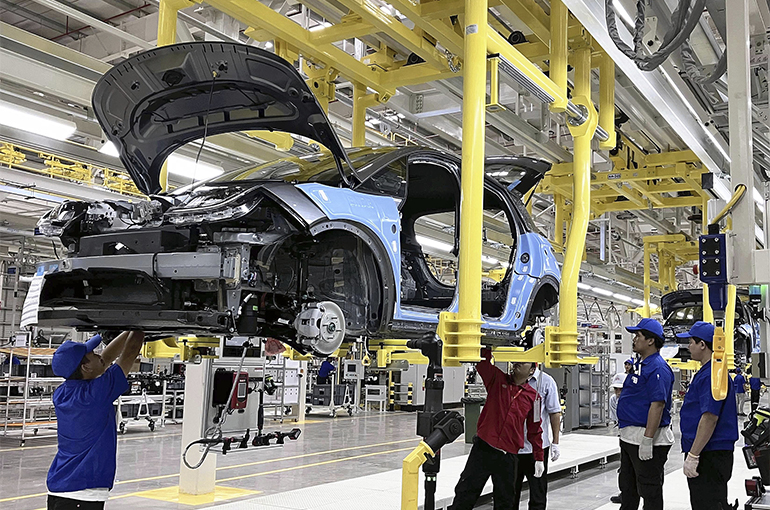 Chinese NEV Manufacturers Expand into Thailand, Face Stiff Rivalry from Japanese Automakers
Chinese NEV Manufacturers Expand into Thailand, Face Stiff Rivalry from Japanese Automakers(Yicai) Aug. 5 -- Chinese carmakers are actively entering the Thai market, either by building factories in the country or by linking arms with local dealers, to expand their footprint in Southeast Asia. But this inevitably leads to strong competition with Japanese vehicle manufacturers already well established in the country.
The route from Suvarnabhumi Airport to Bangkok is lined with billboards of Chinese car marques, such as GAC Aion, BYD and SAIC MG, sending the signal that Chinese automakers have arrived, Yicai’s reporter noticed.
The number of Chinese car factories in Thailand is increasing thanks to Thai government incentives and the booming market. In July, BYD and GAC Aion opened their Thai factories. Nezha Auto, which is owned by Hozon Auto, and SAIC Motor’s MG marque already operate plants in the country. And Changan Automobile and Chery Automobile have factories at the planning stage.
Thai people have started to accept Chinese NEVs after two years of sustained promotions, a number of executives from Chinese electric car startups told Yicai. But as more Chinese autos enter the Thai market, competition with Japanese carmakers is inevitable.
“Japanese carmakers have implemented a ‘deep ploughing’ strategy in the local market for more than 60 years and are still in the first-tier of the auto market. We are striving to catch up," the head of a Chinese NEV firm said.
"Thailand's electric vehicle market is where China's was five years ago, that is at the initial stage of development," Shu Gangzhi, general manager of Nezha’s Thai arm, told Yicai. So what Chinese auto manufacturers need to do at this stage is unite and make the market bigger.
"We hope that through five to 10 years of continuous efforts, more Thai consumers will want to buy Chinese-branded cars," Shu said.
Future Trends
"There are more and more Chinese new energy vehicles on the streets of Thailand,“ said a man surnamed Pondana who has been running a Mitsubishi dealership near Chulalongkorn University in Bangkok since 2004.
The store used to sell a lot of medium and large-sized sport utility vehicles and pickup trucks, but sales have declined in recent years and are getting worse, Pondana said. The future prospects and profits of electric cars are better than those of Japanese fuel-powered vehicles, so the store are looking to become a dealer for Chinese NEVs, he added.
Meanwhile, at the BYD dealership next door, the number of visitors has doubled in the past year. BYD’s subcompact SUV, the Dolphin, is the best-selling model and more than 80 percent of the people who come to the shop are interested in buying this car, the store owner surnamed Passon said.
Although BYD is the most popular electric car brand in Thailand, there is still a gap with Toyota Motor’s sales, a company insider told Yicai. "We need to adjust our market strategy whenever the price of our cars is in the same range as that of our Japanese competitors in order to keep our market share," he said, referring to the promotional efforts Toyota and other Japanese car makers have engaged in since last November to boost sales.
In the first five months, BYD's Thai sales surged 40 percent year on year to 13,000 vehicles, more than Mitsubishi Motors, the person said.
"Thai consumers are particularly sensitive to prices. When they buy new cars, they pay close attention to factors such as prices, exteriors and promotions," Shu said. This means that Thai consumers are mainly interested in entry-level models, so China's NEV compact A-class models will be better positioned to compete with Japanese cars.
The longer-term goal of Chinese automakers that are building factories in Thailand is to focus on the larger Association of Southeast Asian Nations’ market.
When vehicle manufacturers have a relatively complete production chain in Thailand, they can try to develop business in other right-hand drive markets in the ASEAN region, said Zheng Yun, senior partner at Roland Berger and vice president of the German management consultancy firm’s China division, where he is in charge of the automotive team.
Editors: Tang Shihua, Kim Taylor